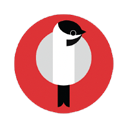Save an injured bird
If you see a bird sitting quietly or lying next to a building, or repeatedly flying towards a window, IT NEEDS YOUR HELP. It has probably suffered a concussion and may have other injuries.
If you can approach a wild bird, it’s not because it likes you or trusts you. It is injured, helpless and terrified. Please treat it accordingly.
Here’s what to do:
- Please act immediately. If you do not rescue the bird, it is very vulnerable to predators (e.g. gulls, crows, cats, foxes, even squirrels), or it may stepped on by an inattentive passerby, or killed by colliding again with the building as it regains its senses. Even if it can fly away, it may die slowly of head trauma or other internal injuries.
- Approach the bird from behind and pick it up by hand. Be very gentle but firm enough so the bird cannot escape. For small birds, cup both your hands around the bird to contain it.
- Alternatively you can use a soft, fine-mesh net, or place a box over it. For larger birds and Mourning Doves, drop a light towel or jacket over it first.
- Place the bird in an unwaxed paper bag with an unscented tissue or small paper towel crumpled in the bottom to give the bird something to perch on. Fold down the top of the bag and secure it with a paperclip. Do not punch holes in the bag.
- Alternatively, you can place it in a cardboard box that is not too much larger than the bird. First, poke some small air holes in the box.
- If you are in Ottawa, call Safe Wings at 613-216-8999 after securing the bird, so we can provide instructions on transporting the bird to one of our rehabbers (by appointment only).
- If you are outside the Ottawa area, bring the bird to your local rehabber.
- Keep the bag or box upright in a dark and quiet place.
- Even if a bird appears unhurt and becomes more active, there is a high likelihood of internal injuries. Please do not release it, but call us for advice.
- Do not handle the bird more than absolutely necessary.
- Do not give the bird food or water.
- If the bird escapes, or if you bring it directly to the Wild Bird Care Centre instead of to Safe Wings, we ask you to please report the collision by completing this form.
- If the bird dies following rescue, please contact us anyway.
Nestlings and fledglings
Young birds found on the ground may or may not need help, depending on their species, age and the situation. Consult the Toronto Wildlife Centre website for detailed advice and help identifying the type and age of the bird. Remember that many bird species like warblers and kinglets are very small, so you cannot always tell a bird’s age by its size.
Baby songbirds found on the ground should be should be returned to the nest if possible if they are not yet fully feathered and if they are uninjured. Click here for guidance from the Toronto Wildlife Centre.
Young songbirds that have left the nest may spend several days on or near the ground as they learn to fly. These fledglings may hop, take very short, fluttery flights or sit in the same spot for a long time. Watch from a distance to see if the parents are around and caring for them. If so, and there are no obvious signs of injury (see below), they should be left alone. Click here for guidance from the Toronto Wildlife Centre.
If you find a fledgling in an dangerous location, such as on or near a road or sidewalk, you can move it a short distance to a safer place.
Keep children and pets well away from birds. During the nesting and fledging season (April-August), always scan your yard for young birds before letting your dog out.
Other situations
Birds in the following situations require help and should be brought to the Wild Bird Care Centre or other local rehabber:
- Lying on its side and floppy
- Bitten, scratched or mouthed by cat or dog, even if there are no obvious wounds
- Covered in oil, paint or other sticky substance
- Hit by a car
- Obviously injured (e.g. leg dangling, can’t stand up, drooping wing, broken beak)
- Trapped or caught (e.g. in fishing gear or garden netting) — do not release until fully assessed by a rehabber.
Birds found in dangerous locations — e.g. on the road, in water (unless it’s a water bird, of course), in a yard with cats, seabirds found inland — may also need help. Call Safe Wings, the Wild Bird Care Centre or your local rehabber for advice.
Some birds, once grounded, cannot take flight from solid ground and need help. These include loons, grebes, and swifts.
Safe Wings holds permits from the Canadian Wildlife Service and the Ontario Ministry of Natural Resources and Forestry allowing our volunteers to rescue and provide treatment to injured birds. Without such permits, it is illegal to posses a live, wild bird; you must bring any injured bird to a rehabber within 24 hours.




